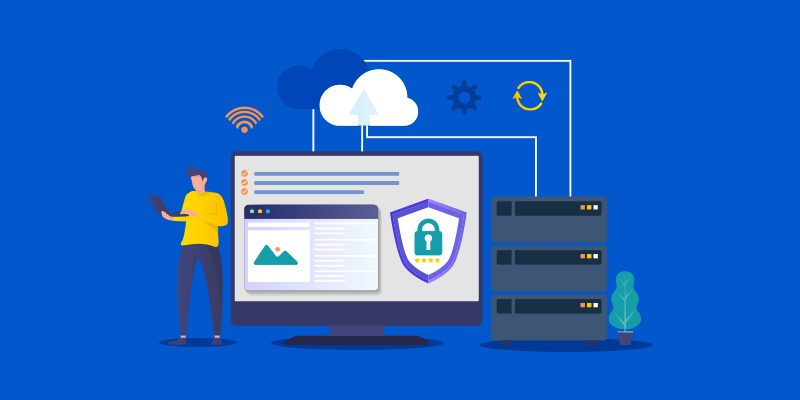What would happen to your business if your server suddenly crashed without warning? It’s a scenario no one wants to face; however, it’s a very real and critical threat. Now imagine this happening without a single backup in place; how would you recover your data? What about your important tasks and customer trust? Such challenging moments highlight the urgent requirement of implementing robust VPS (Virtual Private Server) backup strategies. These strategies prove they are no longer just the steps for precaution; they are important for ensuring business continuity, protecting data integrity, and reducing downtime during unforeseen events.
Companies should use various strategies, such as off-site storage, automated daily backups, and snapshot-based recovery, to ensure fast repair in case of system failure or cyberattacks. Using incremental backups reduces storage usage while keeping up-to-date data. Moreover, regular testing of backup integrity and encryption of backup files are important to avoid data corruption and illegal access. By integrating these strategies, businesses can meaningfully reduce downtime, protect delicate information, and maintain operational resilience.
Main Features of VPS Backup Strategies
A solid VPS backup plan protects data with regular verification, secure storage, and automation. It guarantees speedy recovery from malfunctions, hacks, or unintentional loss, reducing downtime and preserving corporate operations.
- Automation: Automation confirms that backups run on a pre-determined time without human interference. This reduces the risk of human error, guarantees consistency, and ensures that important data is always backed up on time, even if forgotten or ignored.
- Backup Solutions: Selecting the right remote backup solution is very important. Tools like Rsync, JetBackup, or R1Soft offer features like full, incremental, and differential backups, letting users balance speed, storage efficiency, and recovery options based on their requirements.
- Backup Rotation: Maintaining several backup versions over time is known as backup rotation. Effective storage space management is made possible by techniques such as the Grandfather-Father-Son (GFS) model, which maintains daily, weekly, and monthly backups to guarantee that both recent and historical data are accessible.
- Cloud Backup: Cloud backup for VPS provides businesses with reliable remote backup options by backing up data to cloud-based servers. Companies may protect their sensitive data and avoid data loss by using remote backup services from bodHOST. They reduce downtime and the chance of data loss by offering plans that are easily modified and guaranteeing effective and safe data backups.
- Testing and Recovery: Regular testing and recovery drills are crucial aspects of a strong disaster recovery plan to guarantee backups can be restored effectively. Verifying that the data is secure and the recovery process is smooth contributes to system reliability. To guarantee business continuity, bodHOST places a strong emphasis on the necessity of having backup plans and disaster recovery strategies in place.
- Disaster Recovery: Preparing for disaster recovery helps you be ready for the worst-case circumstances, like hardware failures, cyberattacks, or complete VPS failure. It consists of pre-configured recovery images and detailed instructions for restoring systems for use as soon as possible with the least amount of downtime.
- RAID Configuration: RAID Configuration for VPS distributes data across numerous drives to offer redundancy and decrease the risk of data loss due to hardware failure. However, to protect against file corruption or accidental deletion, RAID must be combined with actual backup strategies, as it is not a separate backup solution.
- Off-Site Backups: One important security precaution is to store backups off-site, in a physically different place. This procedure guarantees data recovery even in the event that the primary VPS environment is compromised, protecting against local calamities like theft or fire. By creating a duplicate copy of your data, remote backups serve as a secondary protection for your critical information, protecting it from situations that could compromise your primary server.
- Backup Verification: Backup verification for VPS is important to ensure data integrity and security. With developing cyber threats, unverified backups may hide malware or corrupted files. Verifying that backups are complete, accurate, and restorable helps prevent data loss and protects against hidden risks.
Why VPS Backups Are Significant?
In order to protect data, reduce downtime, and facilitate speedy recovery following system failures or cyberattacks, VPS backups are essential. They offer business continuity, lower recovery costs, and data loss protection.

- Downtime: VPS backups are valuable for reducing downtime brought on by software bugs, server problems, and crashes. Without a backup, it may take hours or even days to continue operations, which could result in lost profits, customer trust, and efficiency. Maintaining regular and reliable backups guarantees that your system can be quickly restored, limiting any disturbance to your company’s or website’s operations.
- Minimizes service disruption and customer impact.
- Supports fast system recovery after crashes.
- Maintains user trust and operational flow.
- Recovery Costs: It can be very expensive to recover lost or corrupted data without a backup, and it regularly demands the use of expert data recovery services or causes significant delays in operations. By employing a backup plan, you may effectively and independently recover your files or system, limiting the need for costly third-party assistance and the financial stress caused by data loss events.
- Saves money on professional recovery services.
- Reduces downtime-related revenue loss.
- Enables fast and cost-effective restoration.
- Security Risks: Important files may be compromised or destroyed by cyberattacks like ransomware, malware outbreaks, or data breaches. Businesses risk losing important data or having to pay fees if they don’t have safe and reliable backups. As a clean recovery point, VPS backups guard against varying security risks and allow secure restoration without transmitting errors or malware.
- Protects data from cyberattacks.
- Allows clean, malware-free recovery.
- Stops extortion and permanent data loss.
What are the Best Practices for VPS Backups?
- Encrypt Backups (Data security) Sensitive information is protected when backups are encrypted, even in the event that the storage site is compromised. It assists in meeting privacy and data protection standards and guards against unwanted access.
- Prevents unauthorized data access
- Secures sensitive and personal information
- Supports regulatory compliance
- Use off-site storage (Disaster recovery readiness): Storing backups in a remote physical or cloud location preserves data from local failures, cyberattacks, or natural disasters, guaranteeing availability during emergencies.
- Protects against local data loss
- Ensures access during disasters
- Adds a security layer
- Automate Backups (Reliability and consistency): Automating backups guarantees frequent updates, reduces human error, and preserves data consistency. Without depending on user input, it ensures that backups always happen on schedule.
- Saves time and effort
- Ensures consistent backup scheduling
- Reduces human error
- Test Your Backups (Data integrity and usability): Test backups frequently to ensure they are complete and restorable. When it matters most, this verifies the accuracy and dependability of the data.
- Detects backup issues early
- Confirms restore success
- Ensures data integrity
FAQ’s
1. How do you back up a VPS?
You can back up a VPS using tools like Rsync, R1Soft, or JetBackup. These create a full or incremental backup of your data, which can be stored locally or offsite.
2. What are backup strategies?
Backup strategies are plans in which multiple copies of data are made and kept up to date to guard against loss or damage, guarantee business continuity, and minimize downtime.
3. What backup method is the most secure?
The most secure strategy includes automated, encrypted backups that are kept offsite or in the cloud, along with frequent testing and a rotation system like GFS (Grandfather-Father-Son).
4. How can I use a backup to restore?
To restore a backup, open your backup tool or control panel, select the backup version you want, and start the restore process to recover your data or system.
5. Is it safe to store backups on the same server?
No. Keeping backups on the same server is unsafe since both live data and backups can be lost due to malware, server failure, or hacking. Always keep backups in a different place.
6. How does bodHOST make backups easy?
bodHOST provides VPS users with peace of mind by simplifying backups through automated scheduling, offsite storage options, and secure, user-friendly tools for one-click backup and restore.
Conclusion:
As a final thought, having a strong backup system is essential for every VPS user. Implementing critical VPS backup strategies into practice is crucial for protecting your company from security risks, VPS downtime, and data loss. You may create a robust system that guarantees continuity and speedy recovery by automating backups, utilizing offsite and encrypted storage, confirming backup integrity, and correctly configuring RAID. Setting these procedures as a top priority not only safeguards your important data but also promotes productivity, trust, and long-term company stability.
bodHOST’s automated and secure backup solutions for Managed VPS Hosting offer not just Business Data Protection with VPS, but also peace of mind.
If you want to keep your VPS safe and hassle-free, choose a reliable backup plan today, because prevention is always better than cure!
For more information, read the blog: Why Your Website Needs NVMe SSD-powered VPS Hosting
